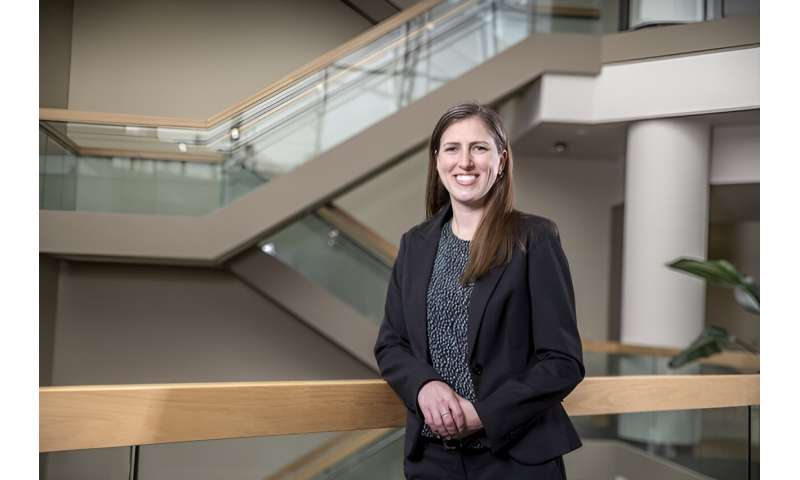Dr. Claire Berryman is Uncovering the Connections Between Altitude and Weight Loss

In the field of weight loss research, traditional approaches like diet and exercise have long taken center stage. But what if there were a hidden factor that could hold the key to unlocking the body's calorie-burning potential? Meet Dr. Claire Berryman, Ph.D., RD, an enthusiastic dietitian and visionary researcher at Pennington Biomedical Research Center, who is on a quest to shed light on the intriguing connections between altitude and weight loss.
Dr. Berryman has an extensive academic background in nutrition science and metabolism studies, and she has dedicated her career to investigating the little-understood role that time spent at high elevations plays in achieving healthy weight. Her passion for the field took root at Penn State University, where she earned an undergraduate degree in Nutritional Sciences, and then a Ph.D. in Nutritional Sciences, which ignited a desire to delve deeper into human metabolism and the effects consuming whole foods, like almonds and walnuts, have on cardiovascular health.
After completing her doctoral studies, Dr. Berryman embarked on a nine-month Dietetic Internship at the James A. Haley Veterans' Hospital in Tampa, Florida—a clinical hospital setting in which she observed first-hand how nutritional interventions can complement medical treatments. Dr. Berryman credits the experience with helping her develop a more holistic appreciation of the nutrition and dietetics field.
After completing her doctoral studies, Dr. Berryman embarked on a nine-month Dietetic Internship at the James A. Haley Veterans' Hospital in Tampa, Florida—a clinical hospital setting in which she observed first-hand how nutritional interventions can complement medical treatments. Dr. Berryman credits the experience with helping her develop a more holistic appreciation of the nutrition and dietetics field.
In August 2022, Dr. Berryman joined the team at Baton Rouge's Pennington Biomedical Research Center—average elevation, 43 feet. Funded by a $2.3 million grant award from the National Institute of Diabetes and Digestive and Kidney Disease, a division of the National Institutes of Health, Dr. Berryman is testing this hypothesis with a comprehensive research study titled the Low Oxygen and Weight Status, or LOWS. Subjects follow a calorie-restricted, controlled diet while spending time at a simulated high elevation to investigate the intricate mechanisms by which altitude influences weight loss.
"We have designed a study that includes a two-week weight maintenance phase, followed by an 8-week period where randomized participants will either sleep in altitude simulation tents or in placebo tents," Dr. Berryman explains of the LOWS study. "We will carefully monitor [the participants'] weight and metabolic changes throughout the study to gain deeper insights into the effects of altitude, the hypothesis being that the group that sleeps in the hypoxic tent will have more weight loss, due to greater energy expenditure, and improved glucose regulation and insulin sensitivity."
Driven by her passion for improving health outcomes by exploring how altitude affects body mass, Dr. Berryman's work at Pennington Biomedical is paving the way for personalized interventions that have the potential to transform the landscape of weight management. If the study proves successful, Dr. Berryman and her colleagues plan to explore strategies for implementing LOWS on a larger scale. Their goal would be to apply LOWS to the cornerstones of obesity management, which remain rooted in exercise and dietary changes.
"Pennington Biomedical has one of the best nutrition and obesity research programs in the world. I learn so much every day from my colleagues, mentors, and visiting scientists. We have access to state-of-the-art research equipment and facilities. I'm glad we have ways to simulate high altitude, so that I was able to join Pennington, in the sea level state of Louisiana, and benefit from its many resources and opportunities."
About the Pennington Biomedical Research Center
The Pennington Biomedical Research Center is at the forefront of medical discovery as it relates to understanding the triggers of obesity, diabetes, cardiovascular disease, cancer and dementia. Pennington Biomedical has the vision to lead the world in promoting metabolic health and eliminating metabolic disease through scientific discoveries that create solutions from cells to society. The Center conducts basic, clinical, and population research, and is affiliated with LSU.
The research enterprise at Pennington Biomedical includes over 480 employees within a network of 40 clinics and research laboratories, and 13 highly specialized core service facilities. Its scientists and physician/scientists are supported by research trainees, lab technicians, nurses, dietitians, and other support personnel. Pennington Biomedical a state-of-the-art research facility on a 222-acre campus in Baton Rouge.
For more information, see www.pbrc.edu.
Provided by Louisiana State University